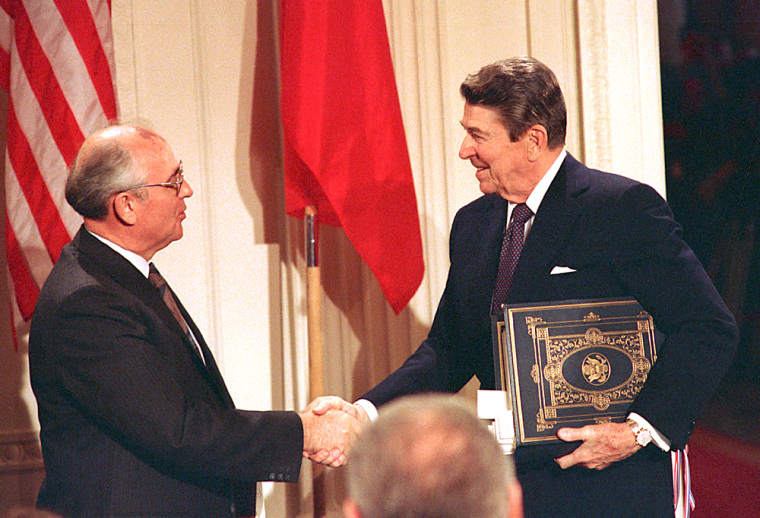He stunned the Soviet Union with his tough rhetoric, calling it an “evil empire” whose leaders gave themselves the “right to commit any crime.”
His famed “Star Wars” program drew the Soviets into a costly arms race it couldn’t afford. His 1987 declaration to Soviet leader Mikhail Gorbachev at the Berlin Wall — “Mr. Gorbachev, tear down this wall” — was the ultimate challenge of the Cold War.
Ronald Reagan’s determination to destroy communism and the Soviet Union was a hallmark of his eight-year presidency, carried out through a harsh nuclear policy toward Moscow that softened only slightly when Gorbachev came to office.
He is vividly remembered in Russia today as the force that precipitated the Soviet collapse.
“Reagan bolstered the U.S. military might to ruin the Soviet economy, and he achieved his goal,” said Gennady Gerasimov, who served as top spokesman for the Soviet Foreign Ministry during the 1980s.
Reagan’s agenda toward Moscow started shortly after the start of his first term — and marked a major departure from the mild detente of the Jimmy Carter administration.
In 1981, Reagan backed his rhetoric with a trillion dollar defense buildup. U.S.-Soviet arms control talks collapsed, and the two nations targeted intermediate-range nuclear missiles at each other across the Iron Curtain in Europe.
The deployment of the U.S. missiles in Europe rattled the Kremlin’s nerves, because of the shorter time they needed to reach targets in the Soviet Union compared to intercontinental missiles deployed in the United States.
In an even bigger shock to the Kremlin, Reagan in 1983 launched an effort to build a shield against intercontinental ballistic missiles involving space-based weapons.
The Strategic Defense Initiative (SDI), dubbed “Star Wars,” dumped the previous doctrine of Mutual Assured Destruction that assumed that neither side would start a nuclear war because it would not be able to avoid imminent destruction.
Even though Reagan’s “Star Wars” never led to the deployment of an actual missile shield, it drew the Soviets into a costly effort to mount a response. Many analysts agree that the race drained Soviet coffers and triggered the economic difficulties that sped up the Soviet collapse in 1991.
“Reagan’s SDI was a very successful blackmail,” Gerasimov told The Associated Press. “The Soviet Union tried to keep up pace with the U.S. military buildup, but the Soviet economy couldn’t endure such competition.”
Yelena Bonner, the widow of Soviet dissident Nobel Prize winner Andrei Sakharov, praised Reagan for his tough course toward the Soviet Union.
“I consider Ronald Reagan one of the greatest U.S. presidents since the World War II because of his staunch resistance to Communism and his efforts to defend human rights,” Bonner said in a telephone interview from her home in Boston. “Reagan’s policy was consistent and precise, and he had a great talent of choosing the right people for his administration.”
Former Soviet dissident Vladimir Bukovsky, 61, remembered Reagan fondly for his humor and his toughness.
“His phrase, ’evil empire,’ became a household word in Russia,” said Bukovsky, who now lives in Cambridge, England. “Russians like a staightforward person, be he enemy or friend. They despise a wishy-washy person.”
Retired Gen. Vladimir Dvorkin said that trying to field a response to Reagan’s Star Wars had “certainly contributed” to Soviet economic demise but argued it didn’t play the decisive role.
“The Soviet economy was extremely inefficient and nothing could save it,” said Dvorkin, a senior Soviet arms control negotiator during the 1980s.
But Bonner said her husband — who had played a key role in designing Soviet nuclear weapons — believed that deploying U.S. missiles in Europe was necessary to bring the Soviet rulers back to the arms control talks.
In December 1987, Reagan and Gorbachev signed a treaty that for the first time eliminated the entire class of intermediate-range missiles.
“Reagan and Gorbachev helped end the Cold War,” Gerasimov said.
